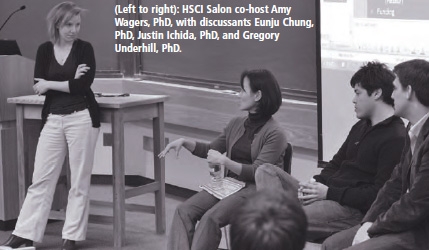 Cell reprogramming is the complex process by which scientists coax cells to an earlier, embryonic-like state, or a later, more differentiated, state—or even directly from one cell type to another—for the purposes of studying disease processes, evaluating drugs, and potentially developing cell-replacement therapies.
Cell reprogramming is the complex process by which scientists coax cells to an earlier, embryonic-like state, or a later, more differentiated, state—or even directly from one cell type to another—for the purposes of studying disease processes, evaluating drugs, and potentially developing cell-replacement therapies.
Advances in this field, many of which have been achieved by HSCI faculty, are taking place at a rapid pace rarely seen in science. On March 9, HSCI hosted a salon, “Regulating the Differentiation State of Cells,” to give members of its scientific community the opportunity to learn about and discuss the latest developments in cell reprogramming.
Evolved from HSCI’s long-running inter-lab meetings, the salons provide an informal setting where members of the HSCI community can share and discuss the latest scientific insights and challenges in stem cell research. Reflecting the keen interest in cell reprogramming, more than 120 researchers attended the salon, the final of three such gatherings offered by HSCI during this academic year.
Held on the Harvard campus, the salon was co-hosted by HSCI faculty members Lee Rubin, PhD, Director of Translational Medicine, and Amy Wagers, PhD, of Harvard’s Department of Stem Cell and Regenerative Biology. The three guest discussants—Justin Ichida, PhD, and Eunju Chung, PhD, of Harvard and Gregory Underhill, PhD, of Massachusetts Institute of Technology—are involved in research looking at different areas of cell differentiation.
Ichida discussed recent advances in reprogramming adult stem cells to an earlier, embryonic-like state (iPS cells) using drug-like chemicals— a significant improvement over the earlier viral approach, which could Salon Focuses on Advances in Regulating Cell Differentiation and Executive Director on overall strategy and representing HSCI externally. One of the group’s most important functions is determining how HSCI’s research funds should be allocated and, through a rigorous annual review process that holds grant recipients accountable, making certain that HSCI’s investments are achieving stated goals. “The broad perspective and collective scientific expertise of the Executive Committee allow us to nimbly direct resources to the most promising areas of stem cell research based on the latest advances in the field,” says Zon, the committee chair. “This is a major benefit for donors to HSCI, who can be reassured that their gifts are being stewarded to have the greatest impact.” trigger undesirable side effects like cancer. As Ichida pointed out, using chemicals to generate safe iPS cells helps bring patient-specific regenerative therapies one step closer to reality.
Chung discussed her research, which involves using chemicals to take embryonic stem cells in the other developmental direction—to produce differentiated cells. While Chung’s work pertains to many cell types, her current research focuses on producing dopaminergic (dopamineproducing) neurons, the specialized type of nerve cells that die or cease functioning in people with Parkinson’s disease.
Massachusetts Institute of Technology researcher Gregory Underhill, PhD, described his work, which uses microtechnology tools to create complex, three-dimensional in vitro systems for regulating and assessing cellular differentiation.
“I found the salon especially intriguing because the speakers presented this research from three different angles,” says attendee Kelvin Lam, PhD, Director of High Throughput Screening at HSCI’s Therapeutic Screening Center. “The salon is a great forum for learning about and discussing cutting-edge areas of stem cell research.”
